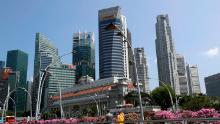
"Singapore definitely has a better game plan," said Fong, who has lived in Hong Kong for four years and works in merchandising at Versace.
Fong isn't alone. Hong Kong and Singapore have long vied to be Asia's premier global business center, but as the Chinese city's international borders remain virtually closed, some businesses and expats are starting to lose patience — and turning to the Southeast Asian hub.
No end in sight
But for many in Hong Kong, the grass is still greener on the other side of the South China Sea.
Frederik Gollob, chairman of the city's European Chamber of Commerce, argues that Singapore is gaining an edge on Hong Kong because of its willingness to signal an end to burdensome pandemic restrictions, even if progress has stalled.
"Of course it's benefiting," he told CNN Business, referring to Singapore. "This is happening as we speak."
Gollob said he knew of "many examples" of companies where C-suite executives were deliberating whether to shift some operations out of Hong Kong, or which were waiting for "office leases to expire." He declined to name those firms, citing sensitivity concerns.
With Singapore's attempt to move forward, "those companies now have an alternative, not because they were actively looking for it, but because of this situation [in Hong Kong], where everything is in limbo and you can't plan ahead," Gollob added.
"This moving or non-existing goalpost is exactly the problem ... businesses hate nothing more than insecurity."
That uncertainty is weighing on Fong. The Versace employee said he had made plans to travel home twice since the start of the pandemic, only to have his trips canceled both times due to changing quarantine restrictions.
"That takes a huge toll," said Fong. "This could well drag on into 2023."
Pressure on the Hong Kong government is mounting. In August, Gollob wrote a widely circulated open letter to Hong Kong Chief Executive Carrie Lam, calling on the city to "open itself sooner rather than later."
"[Otherwise,] this new quarantine regime could lead many in the international community to question if they want to remain indefinitely trapped in Hong Kong when the rest of the world is moving on," he wrote.
Hong Kong last recorded a local Covid infection on August 17, and has for weeks only reported about a handful of cases per day on average, from people entering from overseas.
"It became very clear to us that someone has to ... bring forward a different view on the current situation."
Some executives have taken up their concerns with the government directly, albeit in private. Recently, the Asia Pacific chief of a major European company warned Hong Kong Commerce Secretary Edward Yau that it would move a considerable part of its business to Singapore because of the quarantine restrictions, according to a person familiar with the matter.
"It was an attempt to demonstrate to the government that this [is] not only talking, but things are happening," the person added.
The person declined to share further details, saying they were not authorized to speak on private matters.
The upside of 'zero Covid'
In an interview with CNN Business, Yau said he understood their frustration.
"I would not like to see any single company required to — or being put in a situation to — make the tough decision of leaving," he said. "But that's why we maintain [such] close contact with all the foreign chambers, in explaining to them, and also taking into account their views."
Yau emphasized that there was "no perfect solution" for governments around the world trying to balance both economic and health concerns. "There is no one size fits all," he said. "This is a twin battle that we are fighting."
To be sure, Hong Kong has enjoyed success in tackling the pandemic.
The city recently marked more than 21 days without local infections, Yau noted, while pointing to Singapore's recent uptick in coronavirus cases. The city-state has registered 334 new daily cases on average since the beginning of September.
"Let's not lose sight. This is hard-earned," Yau said. "We must maintain this high level of vigilance."
There have been other bright spots, too. This month, Hong Kong announced that it would loosen some border restrictions, allowing travelers from mainland China and Macao to enter the city without having to quarantine.
Reopening to the mainland has been crucial for businesses who view Hong Kong as a gateway to the vast market there.
To do so, the government has been forced to take "a very robust approach to suppress the importation of infected cases from overseas so that our Covid-19 situation is acceptable to the mainland authorities," according to Lam's office.
But for all the outcry among expats, Yau argues that the local community may not feel the same way.
"I don't think the local community would agree" with the same demands to end quarantine, he said.
Lam's team pointed to local vaccination rates as "less than satisfactory," suggesting that this left its pandemic response options somewhat limited.
An existing shift
Even without the Covid crisis, headhunters were having trouble bringing fresh talent to Hong Kong, according to Jaya Dass, managing director of Singapore and Malaysia at Randstad, a major recruitment firm.
"I think where I see a shift is more on a personal level of how people emotionally feel about living in Hong Kong."
Some business groups have found the same. According to the American Chamber of Commerce in Hong Kong, "an unprecedented number of expatriates [have been] leaving or planning to leave the city over the past few years."
In some cases, the quarantine restrictions in Hong Kong have sped up the decisions for job-seekers to head to Singapore, said Dass.
"I couldn't say it's only based on that," she added. "[But] right now, I think the climate in the pandemic ... makes people reevaluate their choices."
— Carlotta Dotto contributed to this report.









 Add Category
Add Category

